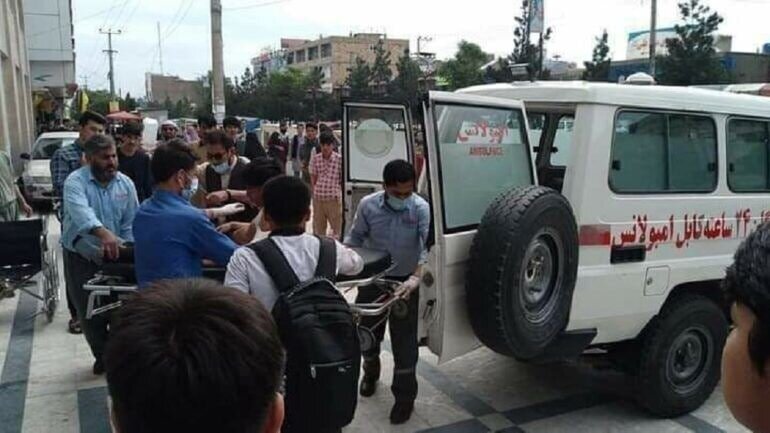A challenge called ISIS to the Taliban government

During Ramadan a powerful blast struck a mosque in western Kabul, killing at least 10 people and wounding 20, officials said. The incident happened amid a spate of attacks on Afghan places of worship and civilian targets.
The Afghan interior ministry confirmed the blast struck the western Kabul mosque at about 2:00 p.m. local time (10:00 a.m. GMT).
Mohammad Nafi Takor, the Taliban spokesman for the interior ministry, could not provide more details, and Taliban security men cordoned off the area. The source of the explosion was not immediately known, and no one claimed responsibility for the blast.
One man, who was inside the mosque, told Reuters a huge explosion tore through the building during prayers, burning his feet and hands. Mohammad Sabir, a resident in the area, said he had seen people being loaded into ambulances after the explosion.
However, the recent blasts have been claimed by ISIS.
Afghanistan's Taliban rulers have said that they have secured the country since taking power last August and essentially eliminated ISIS's local offshoot. However, international officials and analysts said the risk of a resurgence in attacks remains.
Many of the attacks have targeted the Shia religious minority. Sunni mosques have also been attacked.
Bombs exploded on two passenger vans carrying Shia Muslims in the northern city of Mazar-i-Sharif on April 28, killing at least nine people. On April 22, a blast tore through a Sunni mosque during Friday prayers in Kunduz, killing 33 people.
Afghanistan's people have expressed concerns that the country will not find peace anytime soon due to repeated attacks by ISIS.
The ISIS group has been threatening and attacking Afghan people and the newly established Taliban government to destabilize it.
Several strategies are being used to destabilize and discredit the Taliban government.
By carrying out terrorist attacks, ISIS intends to demonstrate that its methods and principles differ from the Taliban's. In its role as a force outside of Afghanistan, ISIS has attempted to recruit members from the Taliban, who appear dissatisfied with the Taliban's current policies. ISIS accuses Taliban leaders of collaborating and colluding with the United States, claiming that Taliban leaders have rejected their invitation to establish a global caliphate.
Security experts believe that by carrying out suicide and bombing operations among civilians, ISIS intends to discredit the Taliban's rule in any way possible. ISIS leaders call the Taliban dirty nationalists who always try to portray the Taliban leaders as weak.
According to the Taliban, ISIS is one of the two internal challenges of their new government. The other is the National Resistance Front.
Since U.S. forces and its European allies left Afghanistan, ISIS's weekly magazine (Al-Naba) has written extensively to ridicule the Taliban victory. In their writings, they claim that the Taliban have deviated from the path of jihad.
"If the Taliban do not show more engagement with Afghan society, ISIS will also have more opportunities to propagate against the Taliban, leading to more movement by the group against the Taliban," said Riccardo Vale, a researcher on extremist Islamism in Afghanistan.
According to media reports, those Taliban fighters who are skeptical of the peaceful decisions of the group's leaders are planning to achieve the main goals set by al-Qaeda leader Osama bin Laden and Taliban founder Mullah Omar joined this group. They believe the Taliban leaders are puppets of Pakistan and the United States in Afghanistan.
According to the report, most Afghan and non-Afghan elites believe that the newly formed Taliban government's efforts to cooperate with the international community, especially the United States, have provoked strong reactions among the group's fighters, leading to disgruntled members of the rival group to join ISIS.
Now that the Taliban have taken complete control in Afghanistan after twenty years, the group has gone from being an offensive actor to a defending one. They must take serious and effective counter-terrorism measures to protect metropolises such as Kabul from the threats of ISIS. However, the critical question is whether they can do so or not. Will the Americans resume their drone strikes against ISIS?
Taliban leaders have recently stated that the Americans do not have the right to send drones into Afghanistan from airspace under the pretext of terrorism; otherwise, they will react. However, as the situation worsens, will it be possible to ask for help, or will the Taliban themselves will nullify terrorist threats by rival groups?
If the answer is no, who will be able to prevent ISIS attacks in the future? Because the Taliban have neither the power of airstrike nor do they have aircraft.
Another issue is that if the Taliban can provide security and a new level of cooperation between the United States and their government, this could create new ranks of disaffected Taliban forces in ISIS. The Pentagon has previously said it had provided intelligence and intelligence assistance to the Taliban to fight ISIS.
This will be an essential issue for the newly established Taliban government. According to the Washington Post, other jihadist groups, including al-Qaeda, have reportedly examined the Taliban's way of governing. The group's leaders monitor the Taliban's way of governing to see if the Taliban have backed down from its principles and norms. The Taliban leaders are waiting to see if their position towards minorities, especially the Shiite community, has changed!
The issues raised above could empty the ranks of the Taliban of its supporters and, this time, end in favor of ISIS.
The question remains for the elites and the people of Afghanistan whether this group can save Afghanistan from terrorism or, this time, they will fall victim to terrorism!
* Said Maisam Moosavi is an Afghan political expert and Ph.D. candidate in regional studies at Tehran University.
Leave a Comment